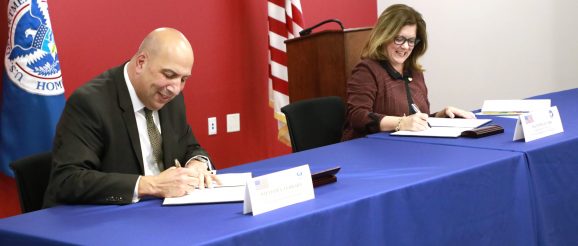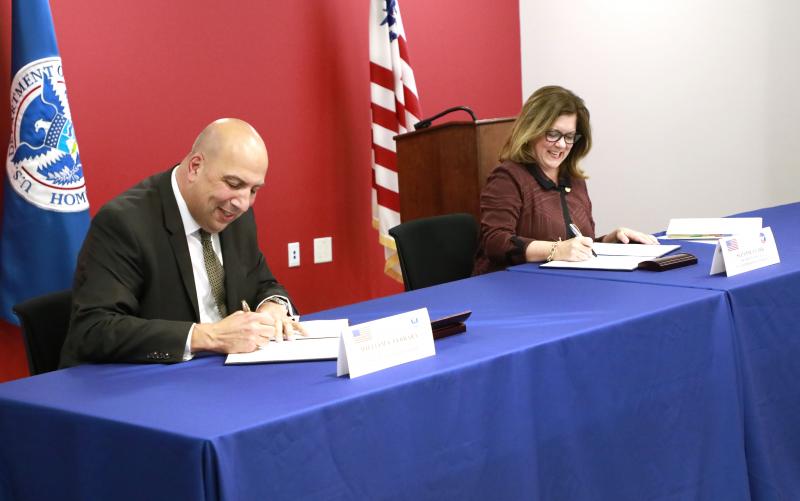CBP and US Chamber of Commerce partner to combat counterfeit goods | The Global Innovation Policy Center

 WASHINGTON — U.S. Customs and Border Protection and the U.S. Chamber of Commerce announced a joint initiative today to prevent the importation of counterfeit and pirated goods.
WASHINGTON — U.S. Customs and Border Protection and the U.S. Chamber of Commerce announced a joint initiative today to prevent the importation of counterfeit and pirated goods.
CBP Executive Assistant Commissioner William A. Ferrara and U.S. Chamber of Commerce President and Chief Executive Officer Suzanne Clark signed a memorandum of understanding on information sharing to enhance intellectual property rights enforcement.
“This memorandum of understanding establishes a first-of-its-kind framework for public-private collaboration on combatting counterfeit and pirated goods,” said William A. Ferrara, CBP Executive Assistant Commissioner for the Office of Field Operations. “Information sharing between CBP and the U.S. Chamber of Commerce will strengthen our ability to defend intellectual property standards that generate American jobs, save lives, and enhance our economic prosperity.”
“Business is proud to partner with law enforcement to prioritize solutions that eliminate counterfeit and pirated goods,” said Suzanne Clark, President & CEO of the U.S. Chamber of Commerce. “Fake goods have real consequences, and consumers should have confidence they are getting what they pay for. Criminal networks are profiting from phony goods that expose Americans to potentially dangerous products, including illicit medicine, makeup, electronics, automotive parts, and toys, to name just a few.”
 In the memorandum, CBP and the U.S. Chamber of Commerce express their intent to enhance the exchange of information concerning known or suspected intellectual property rights violations. The partners also intend to conduct joint training and outreach events and to improve public awareness of efforts to disrupt the trade in counterfeit and pirated goods.
In the memorandum, CBP and the U.S. Chamber of Commerce express their intent to enhance the exchange of information concerning known or suspected intellectual property rights violations. The partners also intend to conduct joint training and outreach events and to improve public awareness of efforts to disrupt the trade in counterfeit and pirated goods.
The Organization for Economic Co-operation and Development estimates that the global trade in counterfeit and pirated goods generates more than $500 billion in illicit proceeds annually. Last fiscal year, CBP seized more than 26,500 shipments that contained millions of counterfeit items, including personal protective equipment, pharmaceuticals, COVID-19 test kits, electronics, apparel, footwear, and jewelry.
Trade in counterfeit and pirated goods threatens America’s innovation economy, the competitiveness of U.S. businesses, and the livelihoods of American workers. In some cases, counterfeit goods contain components or chemical additives that can harm consumers’ health and safety. The proceeds from sales of counterfeit goods fund criminal organizations engaged in drug trafficking, weapons smuggling, financial crime, and other illicit activities.
CBP established an educational initiative called Fake Goods, Real Dangers to raise consumer awareness about the dangers associated with purchasing counterfeit and pirated goods. Consumers can report suspected counterfeits via the e-Allegations Online Reporting System or by calling 1-800-BE-ALERT.
More information about intellectual property rights enforcement is available at CBP.gov and the Global Innovation Policy Center website.
